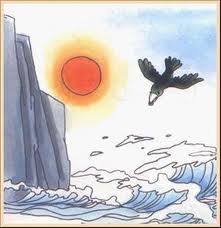成语精卫填海背后的传说(英中对照)

晋代诗人陶潜在诗中写道:“精卫衔微木,将以填沧海”,热烈赞扬精卫小鸟敢于向大海抗争的悲壮战斗精神。“精卫填海”这个成语就是由这个传说而来的,形容那些坚定不移,不屈不挠,不到目的决不罢休的人。比喻志士仁人所从事的艰巨卓越的事业。
Once upon a time, the youngest daughter of Yandi (Emperor Yan), the legendary ruler of primitive China, went sailing on the East China Sea. While she was enjoying herself, a strong wind rose and her boat capsized. Just before she was engulfed by the surging waves, her spirit turned into a beautiful bird. Flying over the roaring sea, it cried sadly with the sound "jingwei, jingwei." Thus, people called it "Jingwei."
从前,炎帝(传说中中国原始社会的统治者)的小女儿在东海上划船。正当她划得高兴时,海面上突然升起一阵大风,把她的小船弄翻了。就在她要被汹涌的波浪吞没时,她的灵魂变成了一只美丽的小鸟。它飞过那咆哮的海面,伤心的叫着“精卫,精卫”的声音,所以人们就叫它“精卫”。
The bird lived on a mountain near the sea. It hated the sea so much that it decided to fill it up. Every day, it flew to and fro between the mountain and the sea, carrying a twig or a pebble from the mountain and dropping it into the sea.
精卫鸟住在靠海的一座山上。它非常恨大海,所以决心要把它填平。它每天来回于山海之间,把从山上衔来的小树枝和小石子扔在大海里。
One day, the roaring sea said to Jingwei, "Poor little bird, stop doing that meaningless thing! You'll never fill me up." Jingwei replied, "No doubt that I'll fill you up! I will, even if it takes me thousands of years! I'll fight on until your doomsday!"
一天,咆哮的大海对精卫说:“可怜的小鸟,停止你那无谓的举动吧!你是永远都填不平我的。”精卫回答说:“我当然会把你填平的!即使这需要千千万万年的时间,我也一定会斗争到底,直到你的末日来临!”
Without taking a rest, the brave little bird kept carrying twigs and pebbles from the mountain to the East China Sea.
这只勇敢的小鸟继续从山上衔来小树枝和小石子,扔到东海中,从未有片刻休息。
From this fable comes the idiom, "The bird Jingwei tries to fill the sea." We use it to describe people who are firm and indomitable and will not stop until they reach their goal.
“精卫填海”这个成语就是由这个传说而来的,形容那些坚定不移,不屈不挠,不到目的决不罢休的人。

晋代诗人陶潜在诗中写道:“精卫衔微木,将以填沧海”,热烈赞扬精卫小鸟敢于向大海抗争的悲壮战斗精神。“精卫填海”这个成语就是由这个传说而来的,形容那些坚定不移,不屈不挠,不到目的决不罢休的人。比喻志士仁人所从事的艰巨卓越的事业。
从前,炎帝(传说中中国原始社会的统治者)的小女儿在东海上划船。正当她划得高兴时,海面上突然升起一阵大风,把她的小船弄翻了。就在她要被汹涌的波浪吞没时,她的灵魂变成了一只美丽的小鸟。它飞过那咆哮的海面,伤心的叫着“精卫,精卫”的声音,所以人们就叫它“精卫”。
精卫鸟住在靠海的一座山上。它非常恨大海,所以决心要把它填平。它每天来回于山海之间,把从山上衔来的小树枝和小石子扔在大海里。
一天,咆哮的大海对精卫说:“可怜的小鸟,停止你那无谓的举动吧!你是永远都填不平我的。”精卫回答说:“我当然会把你填平的!即使这需要千千万万年的时间,我也一定会斗争到底,直到你的末日来临!”
这只勇敢的小鸟继续从山上衔来小树枝和小石子,扔到东海中,从未有片刻休息。
“精卫填海”这个成语就是由这个传说而来的,形容那些坚定不移,不屈不挠,不到目的决不罢休的人。
Once upon a time, the youngest daughter of Yandi (Emperor Yan), the legendary ruler of primitive China, went sailing on the East China Sea. While she was enjoying herself, a strong wind rose and her boat capsized. Just before she was engulfed by the surging waves, her spirit turned into a beautiful bird. Flying over the roaring sea, it cried sadly with the sound "jingwei, jingwei." Thus, people called it "Jingwei."
The bird lived on a mountain near the sea. It hated the sea so much that it decided to fill it up. Every day, it flew to and fro between the mountain and the sea, carrying a twig or a pebble from the mountain and dropping it into the sea.
One day, the roaring sea said to Jingwei, "Poor little bird, stop doing that meaningless thing! You'll never fill me up." Jingwei replied, "No doubt that I'll fill you up! I will, even if it takes me thousands of years! I'll fight on until your doomsday!"
Without taking a rest, the brave little bird kept carrying twigs and pebbles from the mountain to the East China Sea.
From this fable comes the idiom, "The bird Jingwei tries to fill the sea." We use it to describe people who are firm and indomitable and will not stop until they reach their goal.
 八年级上册英语书
八年级上册英语书 高二必修3英语书
高二必修3英语书 高一必修2英语书
高一必修2英语书 七年级上册英语书
七年级上册英语书 高一必修1英语书
高一必修1英语书 五年级下册英语书
五年级下册英语书